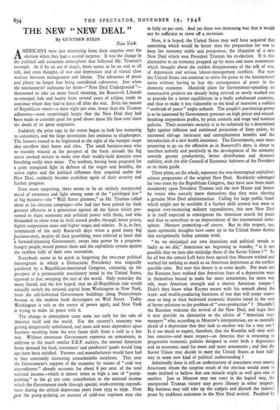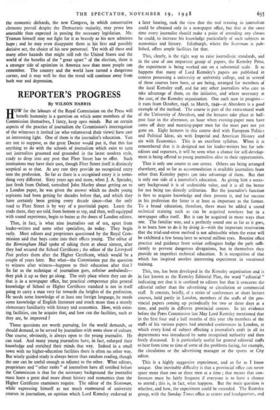THE NEW " NEW DEAL "
By GUNTHER STEIN
New York.
AMERICANS were just recovering from their surprise over the election when they had a second surprise. It was the change in the political and economic atmosphere that followed Mr. Truman's triumph. As if by an act of magic, there seems to be an end to all talk, and even thought, of war and depression and of virtual class warfare between management and labour. The advocates of peace and plenty no longer fear being considered subversive. Just when the reactionaries' nickname for them—" New Deal Underground "- threatened to take on more literal meaning, the Roosevelt Liberals re-emerged hale and hearty from several years of eclipse, ready to continue where they had to leave off after the war. Even the masses of Republican voters—a mere eight per cent. fewer than the Truman adherents—seem surprisingly happy that the New Deal they had been made to consider gone for good shows more life than ever since the death of its great originator.
Suddenly the price tags in the stores began to look less menacing to consumers, and the large inventories less ominous to shopkeepers. The farmers ceased to be frightened at the sight of the bumper crops that overflow their barns and silos. The small business-men who so recently winced at the prospect of the fresh inroads the big trusts seemed certain to make into their weakly-held domains were breathing easily once more. The workers, having been prepared for a grim rearguard fight in defence of the wages and benefits, the union rights and the political influence they acquired under the New Deal, suddenly became confident again of their security and further progress.
Even more surprising, there seems to be an entirely unexpected mood of sweetness and light among some of the " privileged few " of big business—the " Wall Street gluttons," as Mr. Truman called them in his election campaign—who had just been poised for their greatest offensive in a generation against all the forces which pre- sumed to share economic and political power with them, and who demanded to share even in their record profits through lower prices, higher corporation taxes and higher wages and salaries. It is, in fact, reminiscent of the early Roosevelt days when a good many big business-men, despite all their grumbling, were relieved at heart that a forward-planning Government, swept into power by a progress- hungry people, would protect them and the capitalistic system against the reckless folly of their own extremists.
Everybody seems to be quick in forgetting the two-year political interregnum in which a Democratic Presidency was tragically paralysed by a Republican-dominated Congress, conjuring up the prospect of a permanently reactionary trend in the United States, opposed to that sweeping the rest of the world. Only yesterday the many feared, and the few hoped, that an all-Republican rule would virtually switch the national capital from Washington to New York, from the old-fashioned Government buildings along Pennsylvania Avenue to the modern bank skyscrapers on Wall Street. Today Washington is safe as the centre of power again, and New York is trying to make its peace with it.
The change in atmosphere came none too early for the sake of America itself and the world. For the country's economy was getting dangerously unbalanced, and more and more dependent upon business resulting from the ever faster drift from a cold to a hot war. Without enormous Government expenses on armaments, in addition to the much smaller E.R.P. outlays, the normal American home demand for food, consumers' and producers' goods would long ago have been satisfied. Farmers and manufacturers would have had to face constantly increasing unmarketable surpluses. This year the Government's support of the economy by means of " cold war expenditures " already accounts for about 8 per cent. of the total national income—which is almost twice as high a rate of " pump- priming " as the 41 per cent. contribution to the national income which the Government made through special, work-creating expendi- tures during the critical depression years from 1933 to 1939. Next ,year the pump-priming on account of cold-war expenses may rise
to fully to per cent. And yet there was increasing fear that it would not be sufficient to stave off a recession.
Now, it is hoped, the United States may well have acquired that something which would be better than the preparation for war to keep her economy stable and prosperous, the blueprint of a new New Deal which won President Truman his re-election. It is this alternative to an economy propped up by more and more armaments which brought about the sudden disappearance of the talk of war, of depression and serious labour-management conflicts. For now the United States can continue to strive for peace in the international arena without having to fear the consequences of peace in the domestic economy. Manifold plans for Government-spending on constructive projects are already being revived or newly worked out to provide for a better equilibrium in a badly unbalanced economy, and thus to make it less vulnerable to the kind of recession a sudden "outbreak of peace" might unleash. The people's purchasing-power is to be increased by Government pressure on high prices and record- breaking corporation profits, by price controls and wage and taxation policies. Their economic security is to be enhanced by a determined fight against inflation and continued protection of farm prices, by increased old-age insurance and unemployment benefits and the introduction of a new health insurance. The Government, once more preparing to go on the offensive as in Roosevelt's days, is about to interfere actively and positively in the development of the economy towards greater productivity, better distribution and dynamic stability, with the able Council of Economic Advisers of the President as its main guide.
These plans, on the whole, represent the war-interrupted capitalistic reform programme of the original New Deal. Recklessly sabotaged for two years by the Republican Congress, they have now been made mandatory upon President Truman and the new House and Senate by voters who scarcely knew themselves that they were electing a genuine New Deal administration. Calling for large public funds which might not be available if a further drift toward war were to require ever-increasing military expenditures, this new New Deal is in itself expected to reinvigorate the American search for peace and thus to contribute to an improvement of the international atmo- sphere. Moscow permitting—of course. But in this respect, too, more optimistic thoughts have come up in the United States during this exceptionally balmy autumn week.
"As we misjudged our own intentions and political trends as badly as we did," Americans are beginning to wonder, " is it not possible that we may also misjudge those of the Soviet Union ? " So far all but the utmost Left have been agreed that Moscow wished and worked for nothing so much as an American depression at the earliest possible time. But now this theory is in some doubt. For must not the Russians have realised that American fears of a depression were in themselves bound to make for more armaments, for more war talk, more American strength and a shorter American temper ? Didn't they know what Keynes meant with his remark about the work- and wealth-producing functions of war that will tempt states- men so long as their backward economic theories stand in the way of better solutions to the problem of " over-production " ? Shouldn't the Russians welcome the revival of the New Deal, and hope that it may provide an alternative to the advice of " American war- mongers " who, according to Moscow's interpretation, are so mortally afraid of a depression that they look to another war for a way out ? Is it too much to expect, therefore, that the Kremlin will view with less concern—and more respect—an America that is returning to progressive economic policies designed to avert both a depression and an economic need for more and more armaments ; and that the Soviet Union may decide to meet the United States at least half- way in some new kind of political understanding ?
Admittedly there is still an undercurrent of uneasiness even among Americans whom the surprise result of the election would seem to make inclined to believe that one miracle might as well give rise to another. Just as Moscow may not react in the logical way, the unexpected Truman victory may prove illusory in other respects. Big business may still take up the cudgels and disturb the internal peace by stubborn resistance to the New Deal revival. Prodded by
the economic diehards, the new Congress, in which conservative elements prevail despite the Democratic majority, may prove less amenable than expected in passing the necessary legislation. Mr. Truman himself may not fight for it as bravely as his new admirers hope ; and he may even disappoint them in his first and possibly decisive act, the choice of his new personnel. Yet with all these and many other hazards that might still rob the United States and the world of the benefits of the " great upset " of the election, there is a stronger tide of optimism in America now than most people can remember. The country and the world have turned a dangerous corner, and it may well be that the trend will continue away from both war and depression.



































 Previous page
Previous page